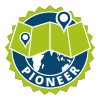Profilangaben

Host Bewertung
80 %

Letzte Antwort
17 Apr. 2024

Beantwortungsquote
75.0 %
Usually responds innerh. 5 Tage

Feedback
15

Verifizierte E-Mail
Abzeichen (2)


Geforderte Mindest-Aufenthaltsdauer: mindestens 2 Wochen
Informationen

Beschreibung
IMPORTANT NOTE: Please read the community profile and volunteer description before replying! If you are interested in being a volunteer, please include in your message:
1) A bit about yourself
2) Your experience teaching or with children
3) Any experience with indigenous communities or knowledge of the hardships they often face
4) Dates available to volunteer
Anank is a small indigenous Achuar community located in the Ecuadorian Amazon along the Pastaza river. Its residents engage in subsistence agriculture, fishing, and hunting. Anank participates in the government conservation incentive program ‘Sociobosque,’ and receives a yearly stipend in exchange for patrolling the forest for illegal logging and hunting and reporting illegal activities to the authorities.
The primary language spoken in Anank is Achuar. Fluency in Spanish varies from person to person. Children attend a bilingual Achuar-Spanish “extension” school and follow the national curriculum as much as is feasible. Although the Ministry of Education requires students to study in English, there are no English-speaking teachers in the region, and English is usually not taught at all in school. As a result, no community member in Anank, nor in neighboring communities, speak English. Anank is among the first Achuar communities to start an English program.
This project is entirely run by the community, which provides an excellent way to fully immerse yourself in the Achuar culture and make positive impact; but it also means that it's not a luxurious or easy experience. The Achuar people live a different way of life in the forest to what outsiders are used to and their mentality is different. They are a disadvantaged community and their lives are hard, which means that while running this project and trying as hard as possible to make it work, they also have their own duties to attend to, and we ask that the volunteers respect this and come with an open mind and independence.
Leaders in Anank have prioritized English language education as community development priority for two reasons. First, knowledge of the English language greatly increases employability for Achuar youth and adults in a region that is economically underdeveloped and in a job market that is historically hostile to indigenous Ecuadorians. Many community members have expressed a desire to work in ecotourism, a sector in which they can support their families, live at home (as opposed to moving to the city), and engage in environmental stewardship. Second, Anank leaders believe that English education will help the next generation better engage with international actors as the forest becomes increasingly threatened by illegal logging and hunting, and even government-sanctioned exploitation, as they have seen happen to other indigenous communities in Pastaza. English education, for them, is a preemptive defense against future attempts to exploit the natural resources of their homeland.
Arten von Hilfe und Lernmöglichkeiten
Sprachpraxis
Hilfe bei Ökoprojekten
Unterrichten
Hilfe mit Computer /Internet

UNO-Ziele für nachhaltige Entwicklung, die dieser Gastgeber verfolgt

Kultureller Austausch und Lernmöglichkeiten
Volunteers will be fully immersed in Achuar language and culture for the duration of their visit. They will have the opportunity to learn Achuar, learn about and see key species of plants and animals, and learn about the community’s conservation efforts. However, please note that the community has a different mentality and can appear a little reserved towards foreigners. Most importantly, the volunteer will gain perspective on the hardships faced by indigenous Amazonian communities in Ecuador.
Volunteers will have mornings, evenings, and weekends free. He or she may take walks along the trails connecting communities, help out in the chakras (small farms), visit other communities, practice Achuar, learn how to make macawas (traditional pottery used to drink chicha) or relax along the shores of the Pastaza River.
Please be understanding towards the community members as they may not always have the time to entertain and accompany you during your free time, as they need to attend to their daily work, but they are happy to have you participate in some of their gatherings and traditional customs, and social events. They can also share some knowledge about local plants and animals.
Projekte mit Kindern
Dieses Projekt schließt möglicherweise den Umgang mit Kindern ein. Mehr Informationen findest du in unseren Verhaltensregeln und Tipps hier.

Arbeit
Anank is looking for an English teacher or teachers to instruct basic English courses for children and adults.
The volunteer is not required to have teaching experience but is highly encouraged to study basic English grammar and methods and develop a curriculum outline before arrival, as well as bring their own materials, as the community does not have any resources apart from a whiteboard.
Volunteers will work with younger children who do not yet read or write, as well as with older children who do. Please note that it may sometimes be difficult to get children engaged as they are asked to do this as extra work after school. So volunteers are encouraged to use games and come up with engaging ideas to keep the children motivated.
Couples are welcome, but they need to bring their own food as the community struggles to feed more than one volunteer. All ages 18+ welcome. Volunteers whose native language is not English are welcome, as long as they are capable of teaching basic English.
Please note: The community members DO NOT SPEAK English. Volunteers should have a basic handle on Spanish to be able to communicate their own needs while in the community, as well as to use in the classroom.
Sprachen
Gesprochene Sprachen
Spanisch: FließendDieser Gastgeber bietet Sprachaustausch an
Dieser Gastgeber gibt an, dass er dir gern seine Muttersprache beibringt oder selbst eine Sprache lernen möchte.
Bitte wende dich direkt an ihn, um weitere Auskünfte zu erhalten.
Unterkunft
PLEASE READ ALL THE INFO BELOW CAREFULLY
Note that you will live in very basic conditions in the rainforest, which is four hours away from the nearest town and only when/if there is a bus. This means it's not an easy adventure, which requires a lot of preparation and you need to bring adequate equipment with you and food. The community will do their best to care for you and will always help, but you need to understand that they have very basic living conditions, few possessions, and their life is hard, so you need to come prepared and be independent. You may also experience a culture shock, but we encourager you to come with an open-mind and flexibility. While this sounds tough, it's also an unforgettable adventure, an incredibly rewarding experience and a great lesson in survival skills!
ACCOMMODATION The volunteer will live in a private cabin, which is a very basic traditional hut. Volunteers should bring a hammock, inflatable mattress, or padding to sleep on.
LIGHT Please also bring some lighting with you. While electricity was installed in Anank, only one or two households have electricity. You may want to bring a lamp with you and batteries.
WATER Please bring a water filter! There is potable water in the community but it may cause digestive issues. Volunteers should request that all water prepared for them be boiled. The volunteer may use the shower at the house of the volunteer coordinator or may bathe in the river.
FOOD If you come alone, the community will provide some basic meals, but this may not be enough, so please plan to bring some food with you that can be easily cooked, such as lentils, rice, canned food, vegetables etc.. Meals cooked by the community typically consist of yucca, potato, or plantain, and fish or meat if it is available (but ii's rather rare). The diet tends to be repetitive, so volunteers who would like variety are encouraged to bring their own food and snacks if they desire. There are no vegetables in the jungle so please remember to bring some with you!
OTHER NECESSARY ITEMS You definitely need long boots as it’s really muddy. Please also consider bring mosquito nets and bug spray - there are a lot of mosquitos. You may also consider bringing your own hammock. It is fine to buy these things on your own if you speak a bit of Spanish and the volunteer coordinator will provide the name of the market place (Mercado La Mariscal).
Was noch ...
IMPORTANT: There is no fee to volunteer, but the community asks that you cover the travel costs of the volunteer coordinator to pick you up in Puyo (approximately $30 total per each volunteer for hotel, transportation, and meals).
GETTING THERE
You can either meet with a volunteer coordinator in Puyo, which is the closest city, or you can travel yourself directly to the community as it's accessible by road. The journey from Puyo takes four hours by bus.
Alternatively, the volunteer coordinator can come and meet you in Puyo and accompany you to their settlement. It can be cost prohibitive for the community, so they ask volunteers to reimburse the volunteer coordinator's travel costs and food. There is sometimes no Internet connection so keep in mind the host may not reply in time and sometimes in rare circumstances they may not be able to pick you up exactly on the date agreed, although they will make their best to do so.
***Please try to plan your dates well in advance and communicate early, and be flexible with your dates if possible.***
Etwas mehr Information

Internet Zugang

Eingeschränkter Internet Zugang

Wir besitzen Tiere

Wir sind Raucher

Familien möglich

Kapazität - wie viele Workawayer maximal
eine(n)

Arbeitszeiten
10 hours/week
Feedback (13)
El ritmo de vida del voluntario es bien conocido de toda la comunidad y la organisacion es de manera que tiene la opportunidad de encontrar todos. La classe de inglés por los niños se da en la tarde. Todos los niños conocen los fundamentos de inglés, y… read more
Feedback
Dies sind zusätzliche optionale Bewertungen, wenn Mitglieder Feedback hinterlassen. Es wird die im Schnitt hinterlassene Bewertung für jede Option angezeigt.
Korrekte Angaben im Profil:
(4.5)
Kultureller Austausch:
(4.8)
Kommunikation:
(4.5)
El ritmo de vida del voluntario es bien conocido de toda la comunidad y la organisacion es de manera que tiene la opportunidad de encontrar todos. La classe de inglés por los niños se da en la tarde. Todos los niños conocen los fundamentos de inglés, y… read more
Everything is super different, you will live in a wooden house surrounded by other community members in the middle of… read more
You are truly immersed in the community and have lots of opportunities to learn about the culture.
The work is easy, 1-3 hour classes 5 days a week. The kids already know some basic English, and are eager to learn, although they can definitely have a lot… read more
I would recommend it to anyone





























